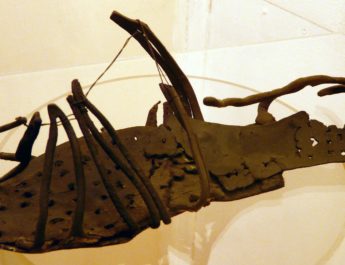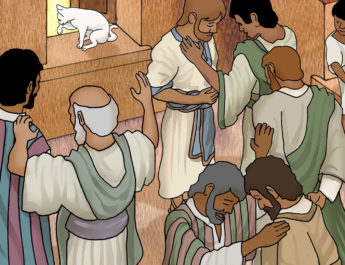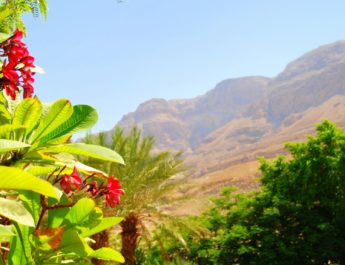Psalm 80:7-15
Proper 22A
7 RestoreA us, O GodB of hosts;C
A “restore” = shub. To turn back, return, turn away – literally or figuratively. Doesn’t necessarily imply going back to where you started from. This is also the root verb for the Hebrew word for repentance “teshubah.”
B “God” = Elohim. From eloah (God, a god); from el (God, a god). This is most commonly used as a name for God. Technically, it’s in the plural, i.e. gods. It can also mean great, mighty, judge, or ruler.
C “hosts” = tsaba. From tsaba (to wage war, serve, assemble, fight, perform, muster, wait on). This is a large group of persons (used figuratively for a group of things). It implies a campaign literally as with army, war, warfare, battle, company, soldiers. Can also be used figuratively for hardship or for worship.
let your faceD shine,E that we may be saved.F
D “face” = paneh. From panah (to turn, face, appear). This is face in a literal or figurative sense. It could be face, presence, anger, respect. It can also be used of God to indicate divine favor or presence.
E “shine” = or. This is to light, shine, set on fire – to be luminous in a literal or figurative sense.
F “saved” = yasha. To deliver, defend, help, preserve, rescue, be safe. Properly, to be open, wide or free, which implies being safe. Used causatively, it means to free.
8 You broughtG a vineH out of Egypt;I
G “brought” = nasa. This is properly pulling up as when one pulls up tent pegs or stakes. This would imply striking tents in order to start a journey. So this could be bring, pullout, set out, journey, or cause to go away.
H “vine” = gephen. Root may mean to twine or bend. So, it is a vine, particularly referring to grapes.
I “Egypt” = Mitsrayim. Perhaps from matsor (besieged or fortified place, bulwark, entrenchment; something hemmed in; a siege or distress or fastness); from tsur (to confine, besiege, to cramp). This is Egypt.
you drove outJ the nationsK and plantedL it.
J “drove out” = garash. This is to cast out or expel. It can be to exile someone or to divorce them.
K “nations” = goy. From the same root as gevah (the back, person, or body); related to gev (among); related to gaah (to rise up). This is nation or people. Often used to refer to Gentiles or foreign nations. It can also be used figuratively for a group of animals. This is where the Yiddish “goy” comes from.
L “planted” = nata. To fix or fasten, establish or plant. This is planting in a literal or figurative sense.
9 You cleared the groundM forN it;
it took deepO rootP and filledQ the land.R
M “cleared the ground” = panah. Related to “face” in v7. See note D above.
N “for” = paneh. Same as “face” in v7. See note D above.
O “took deep” = sharash. 8x in OT. From shoresh (a root, depth, line, heel, bottom; root in a literal or figurative sense). This is to root into soil or uproot.
P “root” = shoresh. Related to “took deep” in v9. See note O above.
Q “filled” = male. This is fill, satisfy, replenish, accomplish, fulfill, confirm, or consecrate. It is fill in a literal or figurative sense.
R “land” = erets. Root may mean to be firm. This is earth, ground, field land, or country.
10 The mountainsS were coveredT with its shade,U
the mightyV cedarsW with its branches;X
S “mountains” = har. From harar (hill or mountain). This is mountain, hill, hilly region.
T “covered” = kasah. This is to cover, conceal, overwhelm. It is to cover as clothes do or to hide a secret.
U “shade” = tsel. From tsalal (to be or become dark, shade; this is the shade as during twilight or shadow as associated with something opaque). This is shade in a literal or figurative sense. So, it could be shadow, shade, protection, shelter, or defense.
V “mighty” = el. Related to “God” in v7. See note B above.
W “cedars” = erez. Perhaps from araz (made from cedar; to be firm, strong). This is cedar or a cedar tree as strong.
X “branches” = anaph. 7x in OT. This is a branch or bough – something that covers.
11 it sent outY its branchesZ to the seaAA
and its shootsBB to the River.CC
Y “sent out” = shalach. This is to send out, away, send for, forsake. It can also mean to divorce or set a slave free.
Z “branches” = qatsiyr. From qatsar (to cut down, be short, reap, curtail; used especially for harvesting grass or grain; figuratively, to be discouraged or grieve). This is branch, harvest, one who harvests. Properly, this means severed, reaped. It is the crop being harvested, the time of harvest or the one who harvests. It can also be a bough.
AA “sea” = yam. Root may mean to roar. This is the sea, often referring to the Mediterranean. It comes from the root in the sense of the roar of crashing surf. This word is sometimes used for rivers or other sources of water. It can mean to the west or to the south.
BB “shoots” = yoneqet. 6x in OT. From yoneq (sapling, sucker); from yanaq (to suckle or to nurse; a nursing mother or for her suckling child.) This is a young shoot or twig.
CC “River” = nahar. From nahar (to flow, sparkle, be cheerful). This is a stream, river, or flood. Particularly used for the Nile or Euphrates. Figuratively, this can mean prosperity.
12 Why then have you broken downDD its walls,EE
so that allFF who pass alongGG the wayHH pluckII its fruit?
DD “broken down” = parats. This is to make a breach, burst out, compel, disperse. It is to break out literally or figuratively.
EE “walls” = gader. 11x in OT. From gadar (to build a wall or wall off, mason, repair, hedge, enclose; to wall in or wall around). This is any kind of enclosure – wall, fence, or hedge.
FF “all” = kol. From kalal (to complete). This is all or every.
GG “pass along” = abar. This is to pass over or cross over. It is used for transitions, whether literal or figurative. It can also mean to escape, alienate, or fail. This is the root verb from which “Hebrew” is drawn.
HH “way” = derek. From darak (to tread, march, to walk. Can also mean affixing a string to a box since one needs to step on it to bend it in the process; so also an archer). This is a road as a thing that is walked on. Can be used figuratively for the path that one’s life takes or how one chooses to live one’s life.
II “pluck” = arah. 2x in OT. This is to gather or pluck.
13 The boarJJ from the forestKK ravagesLL it,
and all that moveMM in the fieldNN feed onOO it.
JJ “boar” = chazir. 7x in OT. May come from a word that means to enclose. This is a pig or boar.
KK “forest” = ya’ar. This is honeycomb, forest, thicket. Root may mean thick with green growth. It is a forest as a place where one would find honeycomb.
LL “ravages” = kirsem. 1x in OT. From kasam (to shear, trim). This is to eat away, tear off.
MM “all that move” = ziyz. 3x in OT. This is moving things like animals, abundance, a full chest.
NN “field” = sadeh. This is literally field, ground, soil, or land. It can be used to mean wild like a wild animal.
OO “feed on” = ra’ah. This is to tend a flock, pasture, or graze. It can mean to rule or to associate with someone. Figuratively, it can be ruler or teacher.
14 Turn again,PP, QQ O God of hosts;
look downRR from heavenSS and see;TT
PP “turn again” = shub. Same as “restore” in v7. See note A above.
QQ {untranslated} = na. This particle is used for requests or for urging. It can be we pray, now, I ask you, oh. This is the same “na” in “hosanna.”
RR “look down” = nabat. This is to behold, look at intently, consider, or scan. It can mean to have respect or regard someone favorably.
SS “heaven” = shamayim. Root may mean being lofty. This is sky, the air, or heaven. It is in a dual noun form so this might refer to the part of the sky where the clouds move on the one hand and the part beyond that where the sun, moon, and stars are on the other hand.
TT “see” = raah. This is to see in a literal or figurative sense so stare, advise, think, view.
have regardUU for this vine,
15 the stockVV that your right handWW planted.XX
UU “have regard” = paqad. This is to attend to or visit – can be used for a friendly or violent encounter. So, it can be to oversee, care for, avenge, or charge.
VV “stock” = kannah. 1x in OT. From the same as ken (gnat, manner); from kanan (vineyard, plant). This is a shoot or plant set in a place.
WW “right hand” = yamin. May be from yamam (to go or choose the right, use the right hand; to be physically fit or firm). This can mean right hand, right side, or south. Since most people are right-handed, the metaphorical usage of this word presumes that the right hand is stronger and more agile. Thus, it is the instrument of power and action.
XX Some manuscripts add “the one whom you made strong for yourself” = al + ben + amets. Ben is from banah (to build or obtain children). This is son, age, child. It is son in a literal or figurative sense. Amets is to be strong, stout, alert, or bold, It can also mean harden, make firm, be courageous or mighty, fortify, or establish. It can refer to physical alertness or mental courage or steadfastness.
Image credit: “Mystery River” by Dr. Matthias Ripp, 2014.




